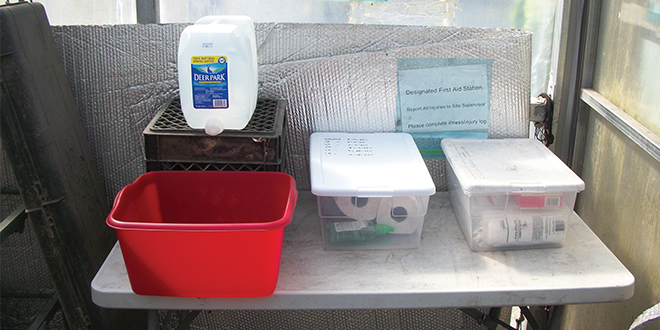Feb 29, 2016Produce handlers: wash your hands with soap and water
The single most important thing produce growers, pickers and handlers can do to prevent the spread of foodborne illness is wash their hands. It can reduce foodborne illness by as much as 80 percent, and germs in general by as much as 50 percent, said Phil Tocco, Michigan State University Extension educator.
According to FDA, an estimated 3.1 million illnesses a year are attributable to produce, with 31 percent of the likelihood of contamination due to the health and hygiene of produce workers. FDA also noted that 91 percent of farm workers do not wash their hands before work, 25 percent do not wash their hands after using the toilet and 30 percent of workers that reported use of a toilet that was provided said they went to the bathroom in the field.
The best method to prevent foodborne illness and other hygiene problems is to wash your hands with soap and water, Tocco said. The type of soap doesn’t really matter. Liquid soap works best from a convenience standpoint, but from a cleanliness standpoint there’s no difference between that and a bar of soap – or soap in any other form. The brand doesn’t matter, either.
What does matter is that soap and water be used for at least 20 seconds, and that hands are dried on a single-use paper towel. Water temperature doesn’t affect cleanliness, but if the water is warm people are more likely to keep their hands in it – especially if it’s cold out, Tocco said.
Hand sanitizer?
GOJO Industries, a company that specializes in hand cleaning, washing and sanitizing, has shared a recent study that states that both soap and alcohol-based hand sanitizers (ABHS) are effective at reducing concentrations of bacteria on farm worker hands. ABHS products reduced up to 99.5 percent of “indicator bacteria” on produce handler hands, even when they were heavily soiled with dirt and organic matter. Soap-based products had similar efficacy.
The study, recently published in The Journal of Food Protection, was led by Juan S. Leon, associate professor at Emory University’s Rollins School of Public Health, who partnered with the Universidad Autónoma de Nuevo León, led by Santos Garcia; GOJO Industries, led by Jim Arbogast; and North Carolina State University, led by Lee-Ann Jaykus.
The study assessed 181 tomato workers in Nuevo Leon, Mexico. After dividing them into groups of soap-based and alcohol-based hand hygiene interventions, their hand samples were analyzed for bacteria reduction. The goal was to determine the most effective way to reduce microbes such as coliforms, E. coli and enterococcus, as well as filth.
“Based on our results, both soap and alcohol-based hand sanitizer can be viewed as good hand hygiene solutions for the fresh produce industry,” Leon said. “The performance of hand hygiene interventions can vary, and hand hygiene products and recommendations will need to be tailored to meet the unique needs of farms and packing facilities in the U.S. and globally.”
“At times, access to good quality soap and water is limited and a significant barrier to adequate hand hygiene,” said Arbogast, GOJO’s vice president of hygiene sciences and public health advancements. “This study demonstrates that alcohol-based hand sanitizer may be a viable option for farm workers, even on heavily soiled hands, in the absence of soap and water.”
Tocco said hand sanitizer is better than nothing if there’s no other option, but it’s not a substitute for soap and water. Most experts will tell you that washing your hands with soap is better than sanitizer; most studies show that sanitizer doesn’t remove dirt as well as soap, and doesn’t kill all bacteria. Also, the Food Safety Modernization Act recommends soap and water, he said.
— Matt Milkovich, managing editor















